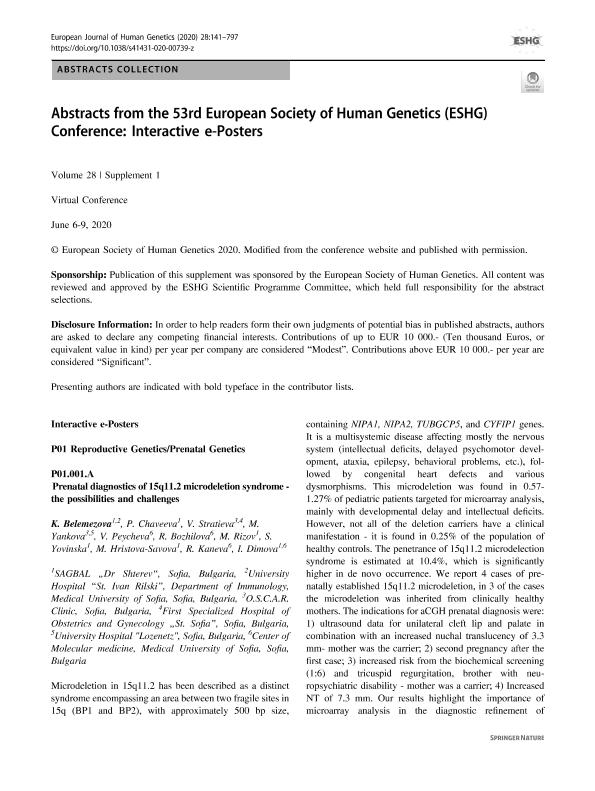Evento
In silico and in vivo analyses of novel variants identified by Whole Exome Sequencing in Argentinean deaf patients: To be or not be pathogenic
Buonfiglio, Paula Inés ; Bruque, Carlos David
; Bruque, Carlos David ; Goldschmidt, Ernesto; Lotersztein, Vanesa; Menazzi, Sebastián; Paoli, Bibiana; Plazas, Paola Viviana
; Goldschmidt, Ernesto; Lotersztein, Vanesa; Menazzi, Sebastián; Paoli, Bibiana; Plazas, Paola Viviana ; Elgoyhen, Ana Belen
; Elgoyhen, Ana Belen ; Dalamon, Viviana Karina
; Dalamon, Viviana Karina
 ; Bruque, Carlos David
; Bruque, Carlos David ; Goldschmidt, Ernesto; Lotersztein, Vanesa; Menazzi, Sebastián; Paoli, Bibiana; Plazas, Paola Viviana
; Goldschmidt, Ernesto; Lotersztein, Vanesa; Menazzi, Sebastián; Paoli, Bibiana; Plazas, Paola Viviana ; Elgoyhen, Ana Belen
; Elgoyhen, Ana Belen ; Dalamon, Viviana Karina
; Dalamon, Viviana Karina
Tipo del evento:
Conferencia
Nombre del evento:
53rd European Society of Human Genetics Conference
Fecha del evento:
06/06/2020
Institución Organizadora:
European Society of Human Genetics;
Título de la revista:
European Journal Of Human Genetics
Editorial:
Nature Publishing Group
ISSN:
1018-4813
e-ISSN:
1476-5438
Idioma:
Inglés
Clasificación temática:
Resumen
Hereditary hearing loss (HHL) is the most common sensory disorder affecting 1 in 500 newborn children. Since HHL is related to more than 150 target genes, we designed a diagnosis strategy in order to identify pathogenic variants.A total of 1250 patients were analyzed for frequent mutations in GJB2 and GJB6 genes by Sanger Sequencing, genotyping 25% of them. From undiagnosed patients, 29 families were selected to perform Whole exome sequencing. After filtering and analysis process, 45% of patients were genotyped, identifying 23 causative mutations (11 novel, 12 reported) classified according to ACMG Standards.Some of the novel variants were further studied in silico by structural and stability studies of the mutated proteins. In addition, datasets from deafness and specific variant databases were correlated with different protein motifs in order to predict the theoretical pathogenicity effect of the aminoacid changes. Furthermore, knock-down phenotype rescue assays in zebrafish are underway to accomplish in vivo validation. In some cases, extensive analysis reinforced the pathogenicity prediction effect of variants and surprisingly, in one case, discouraged the deleterious effect of a genetic variant to the protein.Preliminary results in zebrafish confirmed the pathogenicity of one novel variant in the hair cell function and auditory system.This study shows that our algorithm is successful for the genetic diagnosis of deafness. Comprehensive analysis is crucial to strengthen prediction of variant pathogenicity. These findings highlight the importance of genetic studies followed by in silico and in vivo validation to better understand the genetic basis of HHL.
Palabras clave:
WES
,
HEARING LOSS
,
GENETICS
,
BIOINFORMATICS
Archivos asociados
Licencia
Identificadores
Colecciones
Eventos(INGEBI)
Eventos de INST.DE INVEST.EN ING.GENETICA Y BIOL.MOLECULAR "DR. HECTOR N TORRES"
Eventos de INST.DE INVEST.EN ING.GENETICA Y BIOL.MOLECULAR "DR. HECTOR N TORRES"
Citación
In silico and in vivo analyses of novel variants identified by Whole Exome Sequencing in Argentinean deaf patients: To be or not be pathogenic; 53rd European Society of Human Genetics Conference; Viena; Austria; 2020; 189-189
Compartir
Altmétricas



